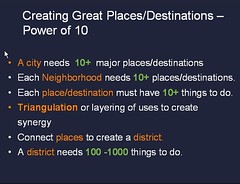Baseball, hot dogs, apple pie, and economic development
Nigel sends us a link to a nice piece from American Magazine, "A Closer Look at Stadium Subsidies," about that ever recurring issue of subsidization of professional sports for economic development reasons.
For the most part, it's merely an economic substitution--you spend money on X instead of Y, but the overall amount of money spent by a household on "entertainment" remains roughly equal.
I do think there is a kind of transfer though, to rich people. And more and more we have to think of these kinds of transfers, and is the economic return on investment worthwhile? The other question is would there be a greater economic ROI from a different form of investment?
Plus, there are an ever increasing array of things that people spend their money on--the competition is tough. Although there is something to be said for public events, events and activities that bring people together, even as spectators, rather than the exclusive and private (i.e., home theaters vs. seeing a movie at a theater).
The issue with the stadium area in DC (and with the Verizon Center) is, would the areas around the stadium/arena have improved with or without the new economic input of sports.
The answer is probably.
But you do have to take into account the increased activity, the layering effect that Fred Kent refers to in "Pride of Place" in Governing Magazine, of having more things to do, what the Project for Public Places now calls the "Power of 10."

Plus, for whatever reason a lot of the patrons for these things are suburbanites, so we get a modicum of their money--not much really in terms of a multiplier effect though, because sports teams have figured out by scheduling their events early and by programming the entire experience they can capture an ever increasing share of wallet around the event.
SO in the old days, people might have eaten somewhere else before the game--supporting local businesses--now they spend more of their time and money within the stadium or arena, in a different form of the network effect of increasing benefits connoting to one particular actor.
But it does make a difference. Adds more excitement etc. I just wish the city got more money out of it.
And the city ends up being at the mercy of the professionalism and skill of the team owner. If the team declines, so does attendance. See "Fans Will Go to Camden Yards, but They Won't Be Rooting for the Home Team," from the New York Times about the decline of attendance for the Baltimore Orioles, which Major League Baseball does not attribute to the creation of the Washington Nationals as a competitor 45 miles up the road.
(Also see "This Diamond Isn't a Gem" from the Washington Post. I haven't been to the stadium yet. I suppose I will sometime this summer.)

Labels: building a local economy, sports and economic development



1 Comments:
Thank you again for your flawless service, and I look forward to working with you in the future.
Post a Comment
<< Home